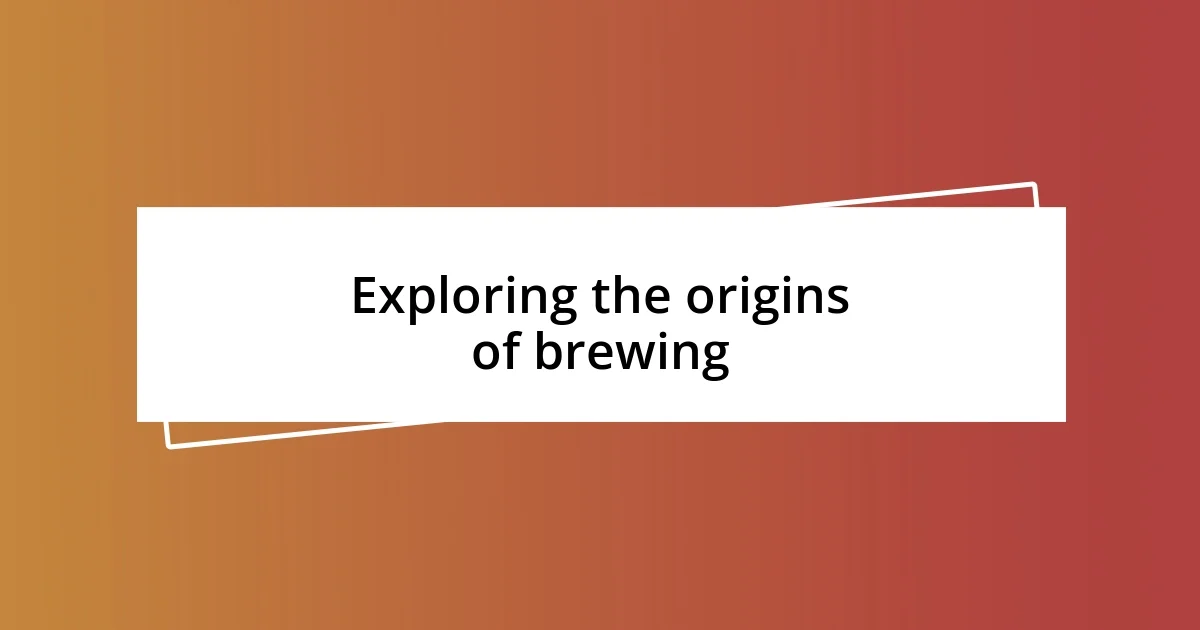Key takeaways:
- Beer has ancient roots, dating back to civilizations like the Sumerians, who associated it with the divine and cultural traditions.
- Key milestones in beer history include the introduction of hops in the 9th century, the Reinheitsgebot in 1516, and the craft beer renaissance in the 1980s, each marking significant advances in brewing.
- The evolution of beer styles, particularly during the Industrial Revolution and the rise of craft breweries, has led to a diverse range of flavors that foster connections and reflect cultural narratives.

Understanding beer’s ancient roots
Beer isn’t just a modern beverage; it has roots that dig deep into the rich soil of our history. Imagine sipping a brew similar to what our ancestors enjoyed thousands of years ago. When I discovered that beer was a staple in ancient Mesopotamia, I couldn’t help but wonder: how did something so simple become a cornerstone of civilization?
As I delve into archaeological findings, I find myself transported to the days of the Sumerians, who believed that beer was a gift from the gods. They even had a goddess, Ninkasi, dedicated to brewing. It’s fascinating to think about how these people celebrated life with a drink that felt sacred. It made me reflect on my own experiences at gatherings, where breaking bread and sharing beer can forge connections and create unforgettable memories.
The more I explore beer’s history, the more I see it as a symbol of community and culture. Each civilization put their unique twist on brewing, leaving behind recipes and stories that are still celebrated today. Have you ever thought about how the craft beer you enjoy might be linked to ancient traditions? This realization has deepened my appreciation for every pint I raise, reminding me that I’m not just drinking; I’m partaking in a centuries-old ritual.

Exploring the origins of brewing
The origins of brewing are nothing short of mesmerizing. I often find myself amazed by how brewing likely began as a serendipitous accident, with primitive grains left to ferment naturally. This effort to produce what we now revere as beer laid the foundation of a practice that would grow and evolve through countless cultures.
- Early evidence of brewing dates back to 7,000 BC in ancient China, where fermented beverages were made from rice, honey, and fruit.
- In Mesopotamia, around 4,000 BC, the Sumerians wrote the “Hymn to Ninkasi,” a prayer that doubled as a recipe for brewing beer.
- The Egyptians brewed beer as part of daily life, using it in religious rituals and for worker compensation.
- Fast forward to medieval Europe, where monasteries became centers of brewing innovation, producing exceptional ales that shaped the beer we know today.
As I ponder these historical threads, it strikes me how integral beer has been to humanity’s journey. Just like the Sumerians, I find that some of my most cherished moments revolve around enjoying a beer with family and friends, feeling a connection to those ancient traditions that continue to shape our lives.

Key milestones in beer history
Beer has woven itself into the tapestry of human history, marking several key milestones. The introduction of hops in the brewing process around the 9th century enhanced flavor and preservation, transforming beer from a basic sustenance into a refined beverage. I still vividly recall my first taste of a hoppy IPA, where the bitterness was unfamiliar yet exhilarating. That experience opened my eyes to the art of brewing and its evolution over the centuries.
By the time we reached the 16th century, the establishment of the Reinheitsgebot, or German Beer Purity Law, codified the ingredients allowed in beer making. This legislation not only emphasized quality but also created a sense of pride among brewers. I often think back to a trip I took to Germany, where I experienced the sheer devotion brewers have for their craft. It was incredible to witness such care for the traditional process, knowing that it stemmed from centuries of brewing heritage.
Fast forward to the craft beer renaissance of the 20th century, which breathed new life into traditional brewing methods. This movement allowed for creativity and personalization in flavor profiles, resulting in the vibrant beer culture we enjoy today. When I see local craft breweries experimenting with flavors like lavender or chili, I feel a sense of excitement. It’s a reminder that, no matter how far we’ve come, beer is a canvas for artistic expression and connection, just like it was for our ancestors.
| Milestone | Year |
|---|---|
| Introduction of hops | 9th century |
| Reinheitsgebot (German Beer Purity Law) | 1516 |
| Craft beer renaissance | 1980s |

The evolution of beer styles
As I explore the evolution of beer styles, I can’t help but think about the delightful journey each sip takes me on. The transformation from those early, grainy concoctions to the diverse range of craft beers today is nothing short of fascinating. I often wonder how ancient brewers would react if they could taste a rich stout or a fruity sour ale—it’s incredible to think about the emotions those flavors evoke and the stories behind them.
The rise of different beer styles, like lagers and ales, during the Industrial Revolution pushed the boundaries even further. With advancements in brewing technology, flavors became more distinct and enjoyable. I remember trying my first smooth lager, which made me appreciate the meticulous care that goes into creating each batch. The lightness and balance amazed me, and I thought, “How did they perfect this?” It directly tied me to a lineage of brewers who dedicated their lives to refining their craft.
Today, the explosion of craft breweries has introduced a kaleidoscope of beer styles, allowing enthusiasts to explore everything from citrus-infused IPAs to spiced winter ales. Each unique brew carries its own narrative—a testament to the creativity and passion of modern-day artisans. I’ve had evenings where tasting flights turned into deep conversations about flavors and memories, reminding me that beer is more than just a beverage; it’s a bridge that connects people across time and cultures. What’s your favorite beer style, and what memories does it stir up for you?

Personal reflections on beer’s impact
Beer’s impact on my life has been profound, intertwining with moments of celebration and reflection. I remember the first time I shared a pint with my father on my 21st birthday. That simple act felt like a rite of passage, bonding us over stories of his youthful escapades with his friends. It’s amazing how beer can create shared experiences that deepen our connections with loved ones.
In many ways, I see beer as a lens through which to understand cultural diversity. During my travels, I’ve enjoyed unique local brews, like a spicy chili beer in Mexico or a crisp apple cider in France. Each choice brought not just flavor but also an immersive peek into the traditions and stories of each region. Isn’t it fascinating how a simple drink can carry the essence of a place? I find myself cherishing these flavors, as they remind me of the world’s vast tapestry woven through shared rituals.
There have also been quieter moments where beer became a personal solace. I recall a rainy evening spent savoring a rich porter while curled up with a good book, reflecting on its depth and warmth. That richness mirrored the complexities of life, evoking a sense of comfort that I didn’t realize I needed. How often do we find peace in small rituals like these? It’s a reminder that beer transcends mere refreshment; it often becomes a companion in life’s varied moments.














